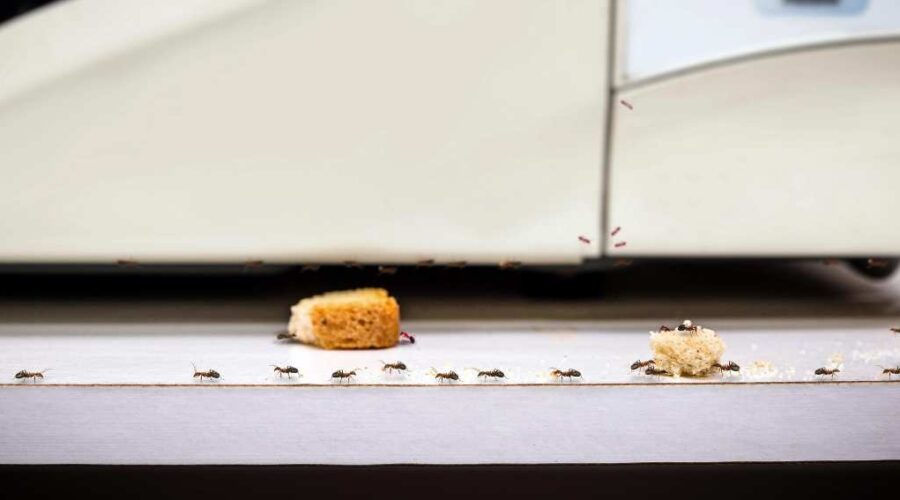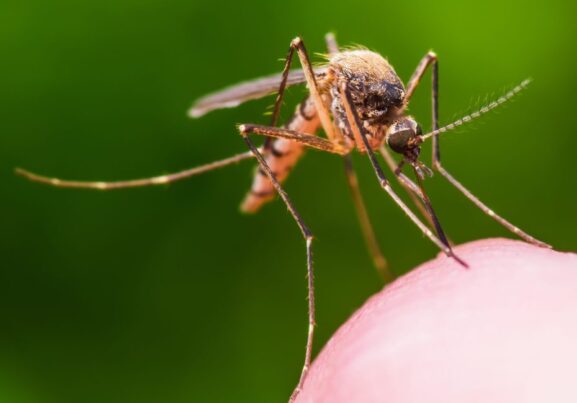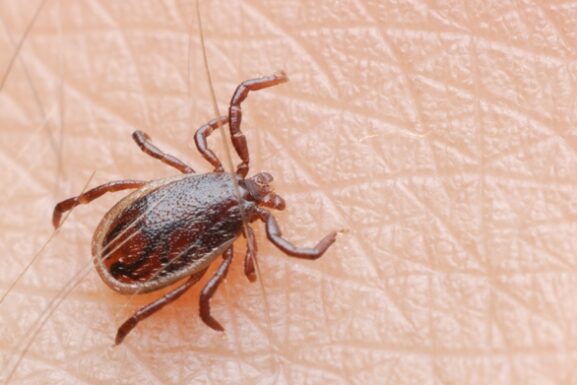Hidden Causes You Might Be Ignoring
Ants are common in commercial kitchens, often appearing despite regular cleaning routines. Their presence isn’t just a nuisance; it can lead to food contamination, failed health inspections, and damage to your establishment’s reputation.
Understanding why ants are attracted to commercial kitchens is crucial. Beyond the obvious crumbs and spills, hidden factors make these environments particularly inviting to ants. By identifying and addressing these less obvious attractants, you can take proactive steps to prevent infestations.
In this guide, we’ll explore why ants are attracted to commercial kitchens and provide practical solutions to keep them away.
Why Commercial Kitchens Are a Magnet for Ants
Commercial kitchens create the ideal environment for ants to thrive. These spaces offer everything ants need to survive—food, moisture, warmth, and countless hiding spots. And because kitchens are constantly in use, there’s little downtime for detecting or interrupting pests.
Here’s why your kitchen may be beautiful to ants:
Constant Access to Food
Even with regular cleaning, crumbs, grease splatters, and spills are hard to get rid of in a busy kitchen. Ants are excellent foragers and can detect even the smallest amount of sugar, syrup, or oil.
Reliable Moisture Sources
Commercial kitchens have numerous water sources, including sinks, dishwashers, steam, and condensation. Ants—especially species like Pharaoh ants—seek out these humid environments to survive and reproduce.
Warmth and Shelter
Ants prefer warm, sheltered environments, especially during colder months. The consistent heat in the kitchen, from ovens, fryers, and dishwashers, creates an ideal nesting ground.
High Foot Traffic = Frequent Disruptions in Cleaning
With staff constantly moving between prep areas, storage, and service counters, it’s easy for food particles to scatter and cleaning to miss hard-to-reach corners.
Plenty of Hidden Spaces
Ants love building nests in quiet, undisturbed places like wall voids, behind cabinets, under floors, and inside electrical outlets—rarely checked or cleaned.
Hidden Causes of Ant Infestations in Commercial Kitchens
Even with a solid cleaning schedule, ants often find ways to stick around. That’s because they’re drawn to things most restaurant staff may not realize are part of the problem. These hidden causes can support whole colonies right inside your kitchen walls.
Let’s look at the most common ones:
Moisture in Unexpected Places
Ants need water just as much as food. Leaky pipes behind sinks, dishwasher steam, and condensation under coolers can become long-term attractants, especially for Pharaoh ants and odorous house ants.
- Check floor drains and mop sinks regularly.
- Clean and dry under refrigeration units
- Address small leaks quickly before they create long-term issues.
Cracks, Gaps, and Unsealed Entry Points
Ants are tiny and can enter through nearly invisible openings. If your kitchen has:
- Gaps in floor tiles
- Unsealed utility lines
- Deteriorating caulk around sinks or baseboards
…then ants will find a way in. These spots also provide hidden entry to food and nesting areas.
Food Residue Left Overnight
Even spotless-looking kitchens can have residue in areas staff miss during closing. Grease buildup behind fryers, crumbs under prep tables, or sugar residue near drink stations can go unnoticed—but not by ants.
Cluttered or Neglected Storage Spaces
Dry storage rooms are often overlooked during routine cleaning. Cardboard boxes, loose packaging, or old ingredients create the perfect shelter and food source.
- Ants can nest in the corrugated lining of cardboard.
- Even small sugar spills inside sealed rooms can attract them.
Garbage and Waste Handling Mistakes
Overflowing bins, open garbage lids, and bins not emptied before closing all provide easy meals for ants. If dumpsters are located close to kitchen doors or loading docks, ants can quickly travel from outside to inside.
Unsealed Dry Goods or Containers
Ants are surprisingly good at finding and entering containers that are not adequately sealed. Bags of flour, sugar, or dry cereal that aren’t airtight become easy targets, especially in humid environments.
Infrequent Deep Cleaning
Many commercial kitchens stick to daily surface cleaning, but skip monthly or quarterly deep cleans. Ants love:
- Areas behind stoves, ovens, or shelving
- Greasy floor corners
- Ceiling tiles or wall voids with crumbs or leaks nearby
The truh is, ants are resourceful. They don’t need much to survive—just one overlooked leak or crumb trail is enough to support a growing colony.
The Risks of Overlooking These Hidden Issues
Ignoring or not noticing what attracts ants in your commercial kitchen can lead to more than just inconvenience. These infestations come with serious consequences that can affect your business’s operations, reputation, and bottom line.
Here’s what’s at stake if you overlook these hidden causes:
Food Contamination
Ants can carry bacteria and pathogens on their bodies and legs. When they walk across prep surfaces, storage containers, or open food, they can contaminate it. This puts your customers at risk and can lead to serious health concerns.
Health Inspection Failures
Toronto Public Health inspectors take pest activity seriously. Seeing ants in your kitchen—or signs of them—can lead to:
- Violation notices
- Fines
- Forced temporary closures
- Public posting of infractions online
Even if the infestation seems minor, it’s a red flag for inspectors and can trigger a more thorough evaluation of your hygiene practices.
Damage to Your Reputation
Ant sightings in dining areas or restrooms can spread quickly through social media and online reviews. Just one photo of ants in a dining space can permanently affect how potential customers view your business.
Repeat Infestations
If the root causes (moisture, entry points, hidden nests) aren’t addressed, ants will return, no matter how often you clean or spray. Repeat infestations also increase your pest control costs and create ongoing stress for your staff.
Operational Disruptions
To address a pest issue, you may need to pause food preparation, close off certain areas of your kitchen, or adjust your workflow. For busy commercial kitchens, this means slower service, frustrated employees, and reduced customer satisfaction.
Short-term fixes won’t protect your business in the long run. If ants keep showing up despite your best efforts, it’s time to look deeper and take action that addresses the full scope of the problem.
What You Can Do About It
The good news is that you can prevent ant infestations in your commercial kitchen if you focus on the right strategies. It’s not just about cleaning more—it’s about cleaning smarter and making proactive changes that remove the root causes of the problem.
Here’s what you can start doing today:
Update Your Cleaning Protocols
Daily cleaning is essential—but it’s not enough on its own. You need to:
- Deep clean behind and beneath all kitchen equipment regularly
- Empty and scrub floor drains weekly.
- Create a rotating schedule for cleaning storage areas, ceilings, vents, and corners.
Ensure your team follows a detailed checklist that includes missed areas.
Seal Entry Points and Fix Moisture Issues
Even the smallest gap or leak can invite ants in.
- Seal cracks in walls, baseboards, and around utility lines
- Install and maintain door sweeps and window seals.
- Repair any plumbing leaks immediately.
- Insulate pipes to prevent condensation buildup.
Use Proper Storage Practices
- Store dry goods in airtight containers.
- Avoid using cardboard boxes long-term.
- Keep food off the floor and away from walls.
- Clean and inspect reusable containers regularly
Train Your Staff to Spot and Report Issues
Your employees are on the front lines—they need to know what to look for.
- Teach them how to identify ant trails, nests, or signs like frass (ant debris)
- Make it part of your opening and closing routine to report pest sightings.
- Encourage a “report early” culture before problems grow.
Partner with a Professional Pest Control Company
Working with experts who understand how commercial kitchens operate is the most effective way to keep ants out permanently.
- They’ll identify hidden attractants you may have missed.
- Use safe, food-industry-approved treatments.
- Offer recurring inspections and maintenance.
- Provide documentation for health inspectors.
By combining innovative prevention with expert support, you’re not just reacting to pest problems but staying ahead of them.
How Pesticon Helps Commercial Kitchens Stay Ant-Free
At Pesticon, we understand the unique pressures you face in running a commercial kitchen—tight schedules, high hygiene standards, and zero tolerance for pests. That’s why we’ve built a service specifically designed for businesses like yours.
Here’s how we help you stay ant-free without disrupting your operations:
Detailed Inspections Focused on Food Service Areas
We go beyond surface-level checks. Our team identifies:
- Hidden moisture zones and food residue build-up
- Wall voids, baseboards, and entry points that ants use
- Nesting sites near heat-generating equipment
This allows us to create a customized action plan that targets the problem, not just the symptoms.
Safe, Targeted Treatments for Kitchen Environments
We only use products that are approved for commercial food settings. That means:
- No harsh odours
- No contamination risks
- No downtime for your operations
Our methods treat the infestation at the source and prevent it from returning
Monitoring and Preventive Maintenance
Ongoing service means you’re never left guessing:
- Scheduled check-ins at intervals that suit your business
- Adjustments to your treatment plan as your kitchen evolves
- Ongoing education for your staff
We stay ahead of pest problems so you don’t have to deal with emergencies.
Health Inspection Support
Do you need documentation for your pest control efforts? We provide:
- Inspection-ready reports
- Logs of pest activity and treatment
- Expert support during and after city health audits
Trusted by Toronto Food Businesses
From restaurants and bakeries to large-scale catering kitchens, Pesticon has helped hundreds of Toronto-based businesses meet health standards and stay ant-free, with a proven track record of reliability and long-term results.
When you choose Pesticon, you’re choosing experience, trust, and complete peace of mind.
Take Control of Ant Problems Before They Take Over Your Kitchen
If ants are showing up in your commercial kitchen, even after cleaning, it means something deeper is attracting them. The longer they stay, the harder they are to remove. That’s where Pesticon comes in.
We’re ready to help you identify the hidden causes, treat the root of the problem, and keep your kitchen safe, clean, and compliant with Toronto’s health regulations.
Don’t let a small ant problem turn into a costly shutdown.
Contact Pesticon today to schedule your free inspection. We’ll show you exactly what’s causing the issue—and how to stop it for good. Your kitchen deserves lasting protection, and we’re here to make sure you get it.



